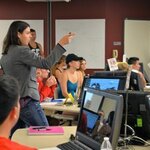
By Neil Morris, University of Leeds
Over the past couple of years, massive open online courses (MOOCs) have taken the academic world by storm. Despite much debate about whether the idea of running free online courses for everyone is both a good and cost-effective idea in the long-run, MOOCs are teaching universities valuable lessons about how students want to learn.
In a recent article for Times Higher Education that shocked many academics, Diane Laurillard claimed “free online courses that require no prior qualifications or fee are a wonderful idea but are not viable”.
I sincerely hope we…







